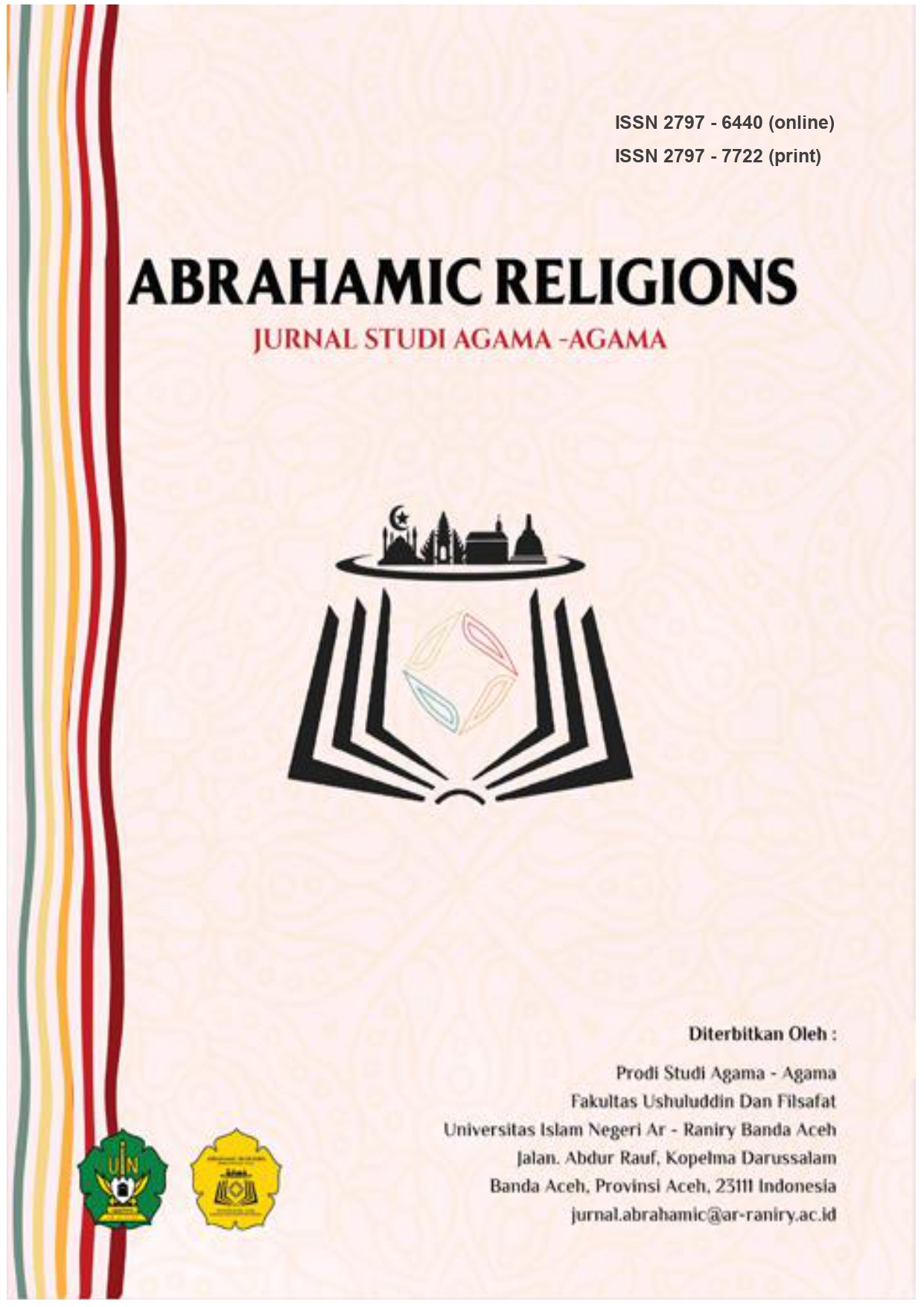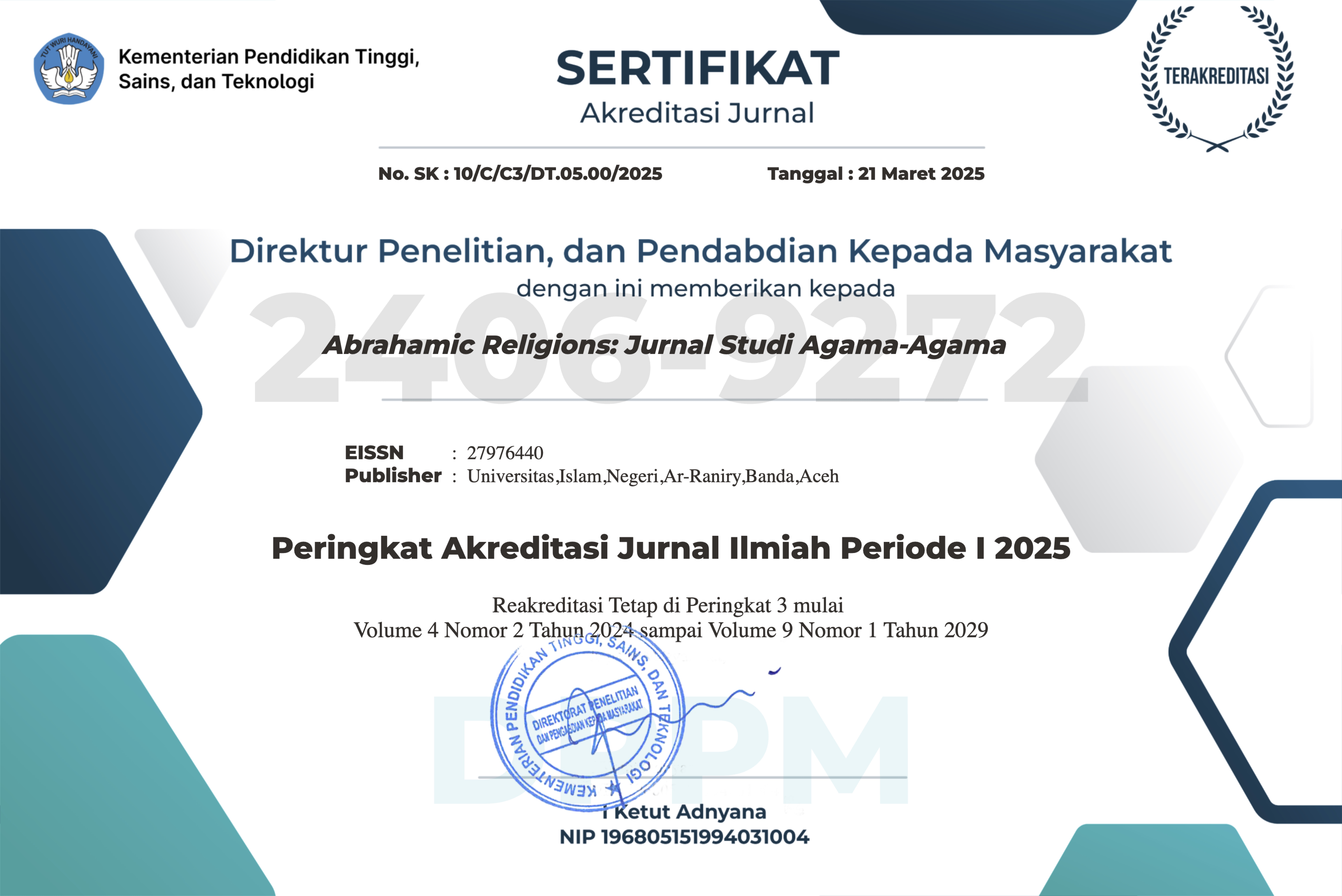Etika Santri di Pesantren Al-fath dalam Prespektif Etika Plato
DOI:
https://doi.org/10.22373/arj.v3i2.20173Keywords:
Santri, Pesantren Al Fath, Etika PlatoAbstract
This research aims to examine the ethics of students (santri) at Al-Fath Student Islamic Boarding School from the perspective of Plato's ethics. Al-Fath Islamic Boarding School is located near the campus of the State Islamic Institute (IAIN) in Kediri, and it specifically admits female students, the majority of whom are IAIN Kediri students. This study employs a qualitative method with a descriptive approach involving a literature review and historical reflection. The study showed that the ethics or moral values observed in the students of Al-Fath Islamic Boarding School share similarities with Plato's ethical teachings. Plato's ethical philosophy emphasizes virtues as its core doctrine, with a focus on how individuals can attain a higher level of virtue through the cultivation of the soul and an understanding of the essence of the world, which is largely a shadow of the world of ideas. The foundation of Plato's ethics is his love for the Supreme Good, which, in the context of this boarding school, refers to God as the ultimate reality. Al-Fath Student Islamic Boarding School has a vision that encompasses morality, knowledge, and active participation in society, with morality or ethics as the primary goal of education, supported by knowledge and an active role in society. Allah, as the God of the universe, serves as the foundation and ultimate goal in achieving happiness through ethical conduct, aligning with Plato's ethical teachings that lead to the Supreme Good.
Abstrak
Artikel ini bertujuan untuk mengkaji etika santri di Pesantren Pelajar Al-Fath dengan perspektif etika Plato. Pesantren Al-Fath terletak di sekitar kampus Institut Agama Islam Negeri (IAIN) Kediri dan secara khusus menerima santriwati, yang sebagian besar merupakan mahasiswi IAIN Kediri. Kajian ini menggunakan metode kualitatif dengan pendekatan deskriptif model studi literatur dan refleksi historis. Hasil penelitian menunjukkan bahwa etika atau akhlak yang diamati pada santri Pesantren Pelajar Al-Fath memiliki kesamaan dengan ajaran etika Plato. Ajaran etika Plato menekankan keutamaan sebagai inti ajaran, dengan penekanan pada bagaimana manusia dapat mencapai derajat yang tinggi melalui proses latihan jiwa dan kesadaran tentang hakikat dunia ini yang sebagian besar merupakan bayang-bayang dari dunia ide. Landasan etika Plato adalah cinta kepada Sang Baik, yang dalam konteks pesantren ini, merujuk kepada Tuhan sebagai realitas tertinggi. Pesantren Pelajar Al-Fath memiliki visi yang mencakup berakhlak, berilmu, dan berperan, dengan akhlak atau etika sebagai tujuan utama dalam pendidikan, didukung oleh pengetahuan dan peran aktif dalam masyarakat. Allah sebagai Tuhan semesta alam adalah landasan dan tujuan utama dalam mencapai kebahagian melalui berakhlak, seiring dengan ajaran etika Plato yang mengarah kepada Sang Maha Baik.
References
Abdullah, M. (2019). Mengurai Model Pendidikan Pesantren Berbasis Moderasi Agama: dari Klasik ke Modern. Prosiding Nasional, 2, 55–74. https://iainkediri.ac.id/prosiding/index.php/pascasarjana/article/view/16
Abdullah, M. A. (2002). Antara Al-Ghazali dan Kant: Filsafat Etika Islam. MIzan.
Arif, M. (2020). Moderasi Islam dan Kebebasan Beragama: Perspektif Mohamed Yatim dan Thaha Jabir Al-Alwani. CV Budi Utama.
Bertens, K. (1979). Sejarah Filsafat Yunani. Kanisius.
Cathcart, T., & Klein, D. M. (2011). Berfilsafat dengan Anekdot “Plato Ngafe Bareng Singa Laut.” Kanisius.
Dhofier, Z. (1994). Tradisi Pesantren, Studi Tentang Pandangan Hidup Kiyai. LP3ES.
Fagothey, A. (2000). Right and Reason: Ethics in Theory and Practice. TAN Books. https://books.google.co.id/books?id=iyoJAAAACAAJ
Figueiredo, M. J. (2005). Bases da Filosofia Política de Aristoteles. Philosophica: International Journal for the History of Philosophy, 13(26), 129–151. https://doi.org/10.5840/philosophica2005132629
Galbraith, M. W. (1995). Community-Based Organizations and the Delivery of Lifelong Learning Opportunities.
Huby, P. (1972). Plato’s Life and Writings, and their Historical Background. In Plato and Modern Morality (pp. 4–12). Macmillan Education UK. https://doi.org/10.1007/978-1-349-01079-0_2
Isma’il, F. F., & Mutawalli, A. H. (2012). Filsafat Barat dan Islam. IRCiSod.
Mubarok, A. A., & Rustam, D. G. (2019). ISLAM NUSANTARA: MODERASI ISLAM DI INDONESIA. Journal of Islamic Studies and Humanities, 3(2), 153–168. https://doi.org/10.21580/jish.32.3160
Sha’bäni, M., Harehdasht, H. A., & Naseri, F. (2019). A Comparative Study of Plato’s and Jane Austen’s Concept of Love in Pride and Prejudice. International Journal of Applied Linguistics and English Literature, 8(3), 37. https://doi.org/10.7575/aiac.ijalel.v.8n.3p.37
Shamey, R. (2020). Plato 427 or 424–347 BC. In Pioneers of Color Science (pp. 7–10). Springer International Publishing. https://doi.org/10.1007/978-3-319-30811-1_2
Sugiyono. (2015). Metode Penelitian Kuantitatif, Kualitatif, dan R&D. In Koleksi Buku UPT Perpustakaan Universitas Negeri Malang. Alfabeta.
Suseno, F. M. (1993). Etika Dasar Masalah-masalah Pokok Filsafat Moral. Kanisius.
Trusted, J. (1997). Plato’s View of Knowledge. In An Introduction to the Philosophy of Knowledge (pp. 25–47). Palgrave Macmillan UK. https://doi.org/10.1057/9780230378247_2
Ya’kub, H. (1996). Etika Islam. Diponegoro.
ZTF, P. B. (2003). Filsafat Islam: sejarah, aliran, dan tokoh. Universitas Muhammadiyah Malang (UMM) Press. https://books.google.co.id/books?id=xF4ptwAACAAJ
Zubaidi. (2007). Pemberdayaan Masyarakat Berbasis Pesantren. Pustaka Pelajar.
Downloads
Published
Issue
Section
License
Authors who publish in this Journal agree to the following terms:
- Authors retain copyright and grant the journal right of first publication with the work simultaneously licensed under Attribution-ShareAlike 4.0 International (CC BY-SA 4.0) allows others to share the work with an acknowledgment of the work's authorship and initial publication in this journal.
- Authors are able to enter into separate, additional contractual arrangements for the non-exclusive distribution of the journal's published version of the work (e.g., post it to an institutional repository or publish it in a book), with an acknowledgment of its initial publication in this journal.
- Authors are permitted and encouraged to post their work online (e.g., in institutional repositories or on their website) prior to and during the submission process, as it can lead to productive exchanges, as well as earlier and greater citation of published work. (See The Effect of Open Acces)















